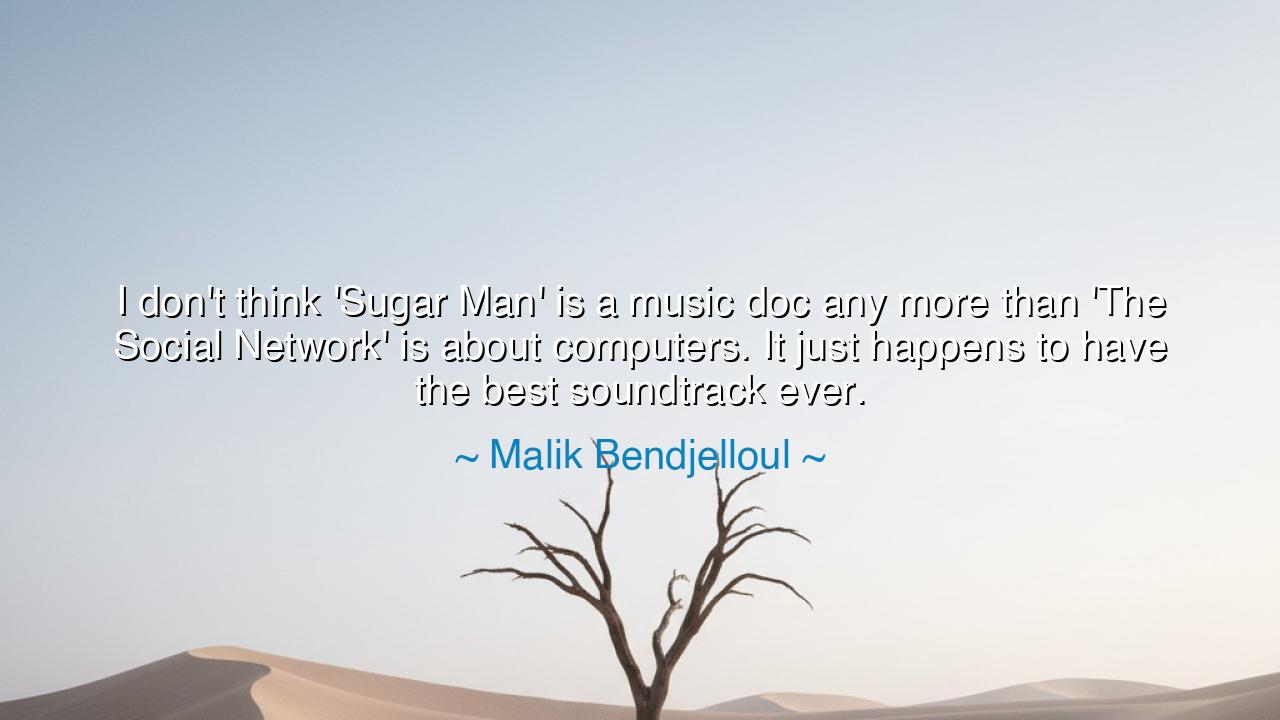
I don't think 'Sugar Man' is a music doc any more than 'The
I don't think 'Sugar Man' is a music doc any more than 'The Social Network' is about computers. It just happens to have the best soundtrack ever.






There are some works of art that transcend their form, rising beyond the limits of their medium to touch the divine. When Malik Bendjelloul, the visionary director of Searching for Sugar Man, declared, “I don’t think ‘Sugar Man’ is a music doc any more than ‘The Social Network’ is about computers. It just happens to have the best soundtrack ever,” he was not simply speaking of film or music — he was revealing a truth about the nature of storytelling itself. His words remind us that the heart of art lies not in its subject, but in its soul; not in what it portrays, but in what it awakens within us.
The meaning of this quote lies in its profound understanding of human experience. Sugar Man, on the surface, is a documentary about the mysterious musician Sixto Rodriguez, a man forgotten by fame but resurrected by love. Yet, as Bendjelloul tells us, it is not truly a “music documentary” — it is a story of hope, obscurity, and redemption. It speaks of how art can outlive its maker, and how truth, though buried, finds its way back into light. In the same way, The Social Network is not about computers; it is about ambition, friendship, betrayal, and the fragile architecture of human desire. Both films, though clothed in the garments of modern technology or music, are in essence about the timeless struggles of the heart.
In his words, Bendjelloul draws a line between the outer form and the inner truth. The unwise see only the surface — the guitars, the code, the machines, the fame. But the wise understand that the artist’s task is not to show the world as it is, but as it feels. Thus, Sugar Man is not the chronicle of a career; it is a hymn to perseverance. It tells us that beauty may be forgotten by the world, yet still echo in hidden corners of the earth. For years, Rodriguez played his music to empty rooms, unaware that his songs had kindled the hearts of strangers on another continent. That revelation, when it came, was not just a discovery of a man — it was a rediscovery of faith in art itself.
This truth is as ancient as the fires of creation. Consider the story of Homer, the blind poet whose songs were sung by others long after he was gone. He had no fame in his own time, no wealth, no monument — yet his words shaped the memory of an entire civilization. In the same way, Rodriguez’s songs became whispers of rebellion and hope in South Africa, long before he even knew of his own legend. Malik Bendjelloul, like a seeker of lost relics, unearthed this tale and gave it back to the world. His film was not about notes or melodies, but about the resurrection of forgotten greatness.
When Bendjelloul compares Sugar Man to The Social Network, he reminds us that true art always transcends its tools. The computer in one story, the music in another — these are the vessels, not the message. What endures is the human element: the yearning to be seen, the pain of isolation, the triumph of connection. Whether it is the rise of a young creator building a digital empire or the rediscovery of an artist lost to time, both stories speak to the same truth — that meaning lies not in what we build, but in why we build it.
There is a melancholy beauty in Bendjelloul’s words as well, for he himself left the world too soon. Like Rodriguez before him, he gave a gift that outlived him — a film that continues to inspire, to remind us that miracles hide in the mundane, and that even the quietest songs can shake the heavens when the time is right. His statement is not one of pride, but of humility. He knew that what made Sugar Man powerful was not his craft alone, but the spirit within the story — the pulse of truth that no lens, no soundtrack, no camera could fully contain.
So, my listener, take this teaching to heart: whether you create with words, music, or machines, remember that your art’s power lies not in its form, but in its essence. Do not be bound by category or convention. Seek the soul within your work. Let your story speak not to what the world sees, but to what it feels. The best soundtrack, as Bendjelloul says, is not merely heard — it is remembered in the heart. For the greatest art does not entertain; it awakens. It reminds us that even in a world ruled by data and devices, it is still the human spirit that gives meaning to every note, every image, and every dream.






AAdministratorAdministrator
Welcome, honored guests. Please leave a comment, we will respond soon